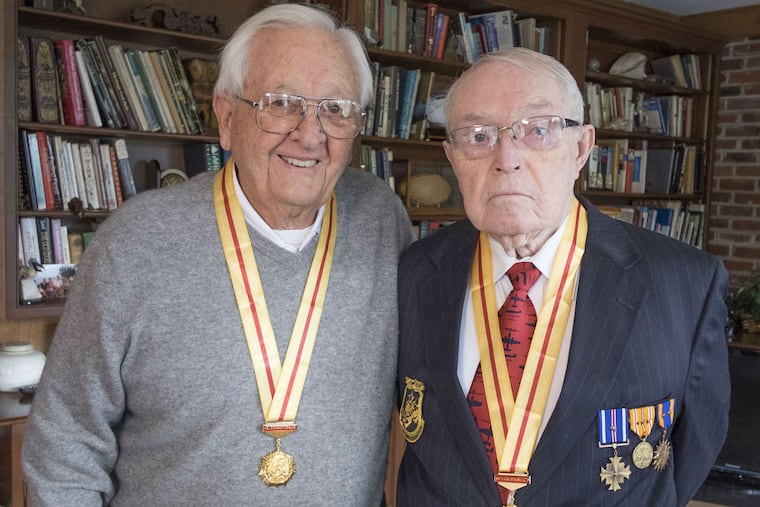China honors Chesco World War II vets
When they came home from the war, they felt like the forgotten ones. The flights over the Himalayas, helping to defend China from Japanese forces, seemed to be overshadowed by the war that played out across Europe and in the Pacific.

When they came home from the war, they felt like the forgotten ones.
The flights over the Himalayas, helping to defend China from Japanese forces, seemed to be overshadowed by the war that played out across Europe and in the Pacific.
But in 1943, Clifford Long, based in China, was dive-bombing Japanese targets in a P-40 plane.
In 1945, Jack Goodrich was flying 16,000 feet above the same ridges of the Himalayas, navigating monsoons to deliver gasoline and ammunition.
And China never forgot their contributions.
This month, Goodrich and Long - who both settled in Chester County - and other surviving World War II veterans who served in the China-Burma-India theater were awarded the equivalent of America's Medal of Honor from the Chinese government for the 70th anniversary of the war's end.
It was not the first time Long, originally from Altoona, Pa., and Goodrich, who grew up in Detroit, had met. More than 50 years after the war and half a world away, the men were both sitting in the Kimberton Golf Club bar.
Goodrich heard someone behind him say "Myitkyina," the name of the city in Burma (now Myanmar) where he was stationed. He turned around and saw Long.
"He said, 'I flew in there,' and I said, 'I lived there,' " Goodrich said.
Their numbers are waning. Of the 16 million Americans who served in the war, only about 850,000 are still living. Nearly 500 World War II vets die each day, according to estimates from the National WWII Museum.
Sitting on the couch in Goodrich's Malvern home last week, the men, now in their early 90s, took turns reminiscing about the war that consumed their early adulthood. Around their necks were shining golden medals, hanging from red ribbons.
"The only way we could keep China in the war was to supply her with what she needed," Goodrich said.
It was an airborne effort to defend against the Japanese air force and to get materials to China after the Japanese cut off supply routes.
Goodrich was a hump pilot, stationed in Myitkyina with about 175 others, he said. They flew supplies from India over the Himalayas, an area that became known as the "hump" for its difficulty to get over.
"When those winds hit up the slopes of the mountains, oh, they twist and turn and tumble," said Goodrich, a former lieutenant. "That was the worst part."
Meanwhile, American fighter pilots swooped through the region. Long, who served earlier than Goodrich, was part of the Flying Tigers of the 14th Air Force, the second incarnation of a now-legendary group that took on the Japanese air force.
"Why, we could drop that bomb on a dime," said Long, who eventually rose to captain. "Your mind is oblivious to anything else. You're focused in that moment in that cockpit. Anything could have happened outside."
Eternally grateful
This year, veterans of the "Forgotten Theater" were presented with the Chinese medals and invited to a celebration in Beijing for the anniversary. But neither Goodrich nor Long felt up to the trip. A delegation came to the United States this month to bring medals to those veterans who did not travel.
"We are eternally grateful for their friendship and devotion, and cherish the special bond built up between our two nations during that chapter of history," said Chinese Embassy spokesman Zhu Haiquan.
"Cliff and I both feel that this is a great honor," said Goodrich, 91.
They gushed about the Chinese people and their country. Both men traveled there as part of delegations in the 2000s that gave speeches and seminars about the war, they said. Long's wedding photo is in a Chinese history textbook.
Long, 90, remembers wearing his Flying Tigers cap in an airport not long ago when a young man struck up a conversation about the war.
Then he asked Long about China.
"He said, 'They're our enemy, aren't they?' " Long said. "That is sad."
Love of flying
The men both spent their lives in the Philadelphia region, Long working for Gulf Oil Corp. and Goodrich for United Engineers.
Long had the name of his high school girlfriend, Shirley, painted on his P-40. When he returned to Pennsylvania, he married her. They now live in West Chester and celebrated their 70th anniversary last month.
After the war, Goodrich returned to Michigan State University, where he met his wife, Lois, whom he married in 1950. They moved soon after to the Malvern house they still share.
The men talk about their missions as if the memories were fresh.
"In my old age, I'm reliving that," Long said. "I don't know what kind of a disease it is, but I got it."
He held up the leather bomber jacket he wore during the 104 missions he flew as a "19-year-old baby" and fingered a small round object still sewn into the bottom: a compass, to use if he were shot down.
Long still has his flying cap, too, with the goggles attached and one lens shattered from a Japanese bullet that glanced off and left Long unscathed. "I believed that the love of flying overshadowed the dangers," Long said.
"I didn't think of being killed when I went down on these targets. I was totally focused on the mission . . . not [on] the many deaths I caused. And that's hard to take now as an old man."
Goodrich looked at his comrade. "We did it, as you say, for the love of flying."
610-313-8205
@McDanielJustine